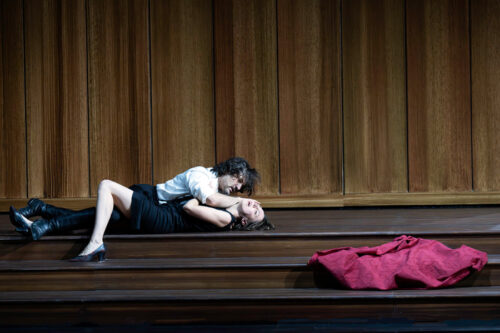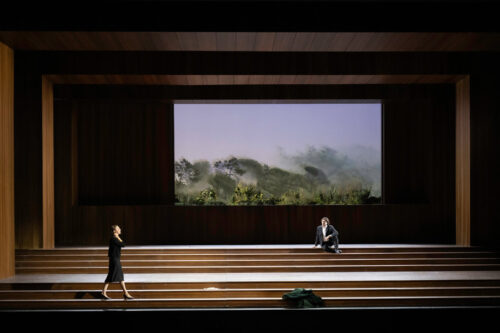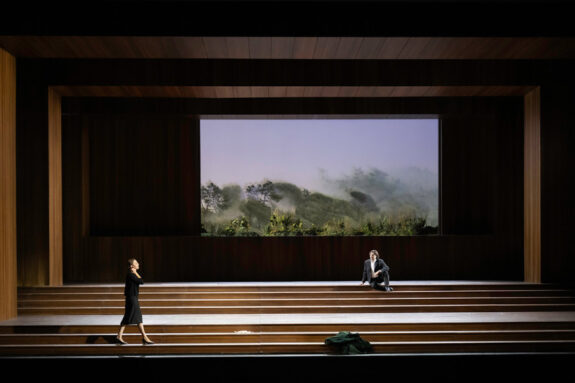 Germany Respighi, La fiamma: Soloists, Chorus, Extra Chorus and Children’s Chorus of Deutsche Oper Berlin, Orchestra of Deutsche Oper Berlin / Carlo Rizzi (conductor). Deutsche Oper Berlin, 29.9.2024. (AB)
Germany Respighi, La fiamma: Soloists, Chorus, Extra Chorus and Children’s Chorus of Deutsche Oper Berlin, Orchestra of Deutsche Oper Berlin / Carlo Rizzi (conductor). Deutsche Oper Berlin, 29.9.2024. (AB)

Ottorino Respighi’s La fiamma (The Flame) is certainly not for the faint-hearted. Christof Loy’s modern staging of this tragic opera, a rarity in the repertoire since its 1934 debut, at the Deutsche Oper Berlin, transformed an overlooked work into an emotionally and intellectually intense experience.
At its core, La fiamma is steeped in superstition, mass hysteria, and tragedy. Written during the height of fascism in Italy and first performed in Rome in the presence of the Duce, the opera avoids overt political statements, yet its portrayal of women accused of witchcraft carries a resonance that is difficult to ignore. The librettist, Claudio Guastalla, was Jewish, and the fact that Mussolini and others like him admired the work adds another layer of complexity to its reception.
Loy’s decision to avoid drawing direct parallels to contemporary political or social issues was both a strength and a weakness of the production — it allowed the opera to stand on its own historical terms but also missed an opportunity to make a more pointed statement about the persistence of witch hunts in modern society.
Set in seventh-century Ravenna under Byzantine rule, it tells the tale of Silvana, a young woman trapped in an oppressive marriage to a much older man, whose heart belongs not to her husband but to her stepson, Donello. The doomed romance unfolds amidst accusations of witchcraft, familial betrayal, and the ever-present threat of societal persecution.
At the Deutsche Oper, however, this was not merely a return to the work’s gloomy historical roots. Loy, known for his often refined and minimalist approach, presented a visually subdued but emotionally charged production. Set designer Herbert Murauer’s monochromatic wooden backdrop, evoking the interior design of the Deutsche Oper itself, set the tone for the evening. It was an abstract and timeless space, one where the medieval witch hunts of the plot felt uncomfortably contemporary. As the characters descended deeper into intrigue and treachery, the set remained eerily static — perhaps a visual metaphor for the unchanging, inescapable fate of the protagonists.

The sparseness of the set contrasted starkly with Respighi’s lush and complex orchestration. Although La fiamma lacks extended melodic phrases for the singers, let alone anything resembling arias, the dark, often violent tone of the orchestral setting — firmly rooted in diatonic harmonies despite its year of composition — is undeniably overwhelming.
Carlo Rizzi, at the helm of the Deutsche Oper’s orchestra, skilfully navigated the shifting currents of Respighi’s extensive score, which does not hide its origins from a variety of sources: large sections reminded one of Puccini or Rimsky-Korsakov — Respighi’s teacher during his time in Russia — and there were allusions to impressionist and neo-renaissance soundworlds, albeit with broad strokes.
The choral scenes brought out the masses and were highly effective, with the Deutsche Oper’s two superb main and children’s choruses, expertly directed by Jeremy Bines and Christian Lindhorst, respectively. Thunderous and imposing, they underscored the sense of inevitable catastrophe looming over the stage.
Olesya Golovneva’s as Silvana delivered a stunning performance that was both vocally and emotionally raw. Her voice, clear and sharp in the high register, captured Silvana’s vulnerability and inner turmoil, while her stage presence conveyed a woman trapped by forces beyond her control.
Opposite Golovneva, Georgy Vasiliev’s Donello provided a less compelling counterbalance. Although he looked the part of the dashing young lover, his vocal performance, while technically even, lacked the passion and fire one might expect from such a role.
Baritone Ivan Inverardi superbly sang and played the cuckolded husband, who does not survive the betrayal.
Additional dramatic weight came from the formidable duo of Martina Serafin as Eudossia and Doris Soffel as Agnese di Cervia. Serafin’s Eudossia, the embittered mother-in-law who despises Silvana, was a masterclass in cold rage. While her vocal performance was rich and commanding, it was Soffel, celebrating half a century on the stage, who almost stole the show. As the accused witch Agnese, Soffel’s voice still carried a ferocity that belied her years. Her dramatic intensity in the opening scene, where she is dragged to the stake cursing Silvana, set the tone for the opera’s descent into madness.
One of the most poignant moments, however, came not from the central love triangle but from the interactions between Silvana and her friend Monica, sensitively portrayed by Sua Jo. In a rare, quiet, and gentle moment, the two women shared a scene that resonated deeply, both for its tender intimacy and for the underlying theme of female solidarity in a world hostile to their desires.
Loy’s cool and elegant visual aesthetic, almost detached from the disturbing emotional core of the music, was reinforced by Barbara Drohsin’s costume designs, with everyone dressed in simple black.
By the time the final scene ended, everyone felt crushed under the weight of it all. There were no gestures or sounds of redemption or catharsis — just a sense of inevitability, as the characters succumbed to their fates one by one.
In the end, La fiamma remains a problematic and curious work, both musically and dramatically. The Deutsche Oper’s revival of this dark, long-forgotten opera may not have left its audience with a spring in their step, but it certainly gave them much to ponder.
Andreas Bücker
Production:
Director – Christof Loy
Set designs – Herbert Murauer
Costumes – Barbara Drosihn
Lighting – Fabrice Kebour
Dramaturgy – Konstantin Parmian
Chorus director – Jeremy Birnes
Children’s Chorus director – Christian Lindhorst
Cast:
Silvane – Olesya Golovneva
Donello – Georgy Vasiliev
Basilio – Ivan Inverardi
Eudossia – Martina Serafin
Agnese di Cervia – Doris Soffel
Monica – Sua Jo
Agata – Cristina Toledo
Lucilla – Martina Baroni
Sabrina – Karis Tucker
Zoe – Caren van Oijen
Exorcist – Patrick Guetti
Bishop – Manuel Fuentes
A mother – Caitlin Gotimer
A young fanatic – Chance Jonas-O’Toole
Old woman – Silvia Pohl
Henchmen – Andrea Spartà, Nicolas Franciscus, Koray Tuna
Cesario di Gello – Aleksandr Sher
